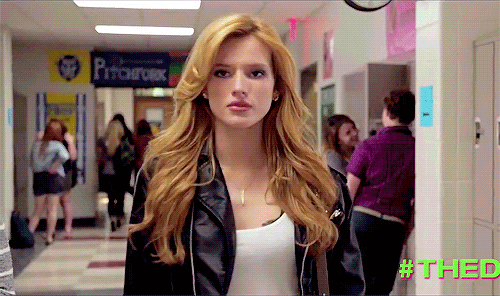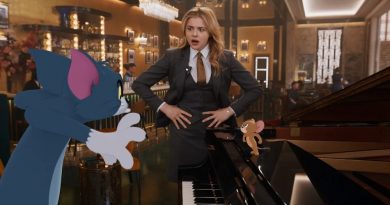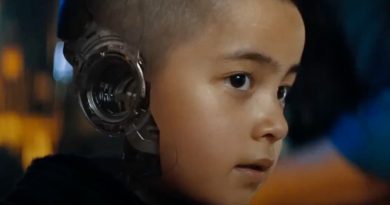Interview: Bella Thorne on The Duff

Feature by Dan Woburn
Roundtable interview with Bella Thorne, who plays the bitchy ‘mean girl’ archetype in the latest entry to the US teen film canon, The Duff. Bella also took some time to reflect on her career origins with the Disney Channel’s Shake It Up and her role in the upcoming Scream TV series adap.
The Duff is about an American high school senior who instigates a social pecking order revolution after finding out that she has been labeled the DUFF – Designated Ugly Fat Friend – by her prettier, more popular counterparts.
So what was it about The Duff that first appealed to you?
It was a comedy, [and] I hadn’t read a script in a long time that was so funny.
So what was it you found quite funny about it?
Just the dialogue – it’s hard when you read a script because usually a lot of the ‘funny’ comes when you’re just in the moment, doing, acting, doing physical comedy and everything like that. In the script there’s no physical comedy or anything like that needed, it’s just in the writing that’s just naturally funny. One of the funniest parts that I read was when [Bianca, played by Mae Whitman] pulls up and she’s like feeling all badass, and then she parks in between these two really nice cars and she’s like “even my car is the DUFF!”.
Did you originally audition for the part of Madison?
I auditioned for the part of Bianca, and that’s who I wanted, and then Ari [Sandel, director] loved me but he said that I was not gonna be Bianca, and so he asked me to look at a different character. So he gave me Madison.
Was there anything in particular that you liked after looking at Madison, is there anything particular that you liked about her?
Just the fact that I can make today’s ‘Mean Girl’ very different than what everyone thinks of a Mean Girl, as like, y’know, a dumb ditzy blonde with the big boobs and the pretty face that’s kind of all they think of her. And I made sure this character was very different.
So you don’t just have the stereotype. You can really feel her insecurities, and that is really important.
Oh, thank you!
You can see that she’s not just mean, but a human being.
Thank you. There was another cut of the movie which I wish was in there that kind of showed that more, that made the character a little more likeable. I think the only problem with Madison is she’s – I’m just so unlikeable in the film because I’m just so mean the whole time – there’s no, like, everybody else has like, their moment in the sun and my character doesn’t because she’s just mean!
But you did it so well!
Yeah.
You said your character is so different, but did you look at any of the classic Mean Girls from the past for inspiration?
The main inspiration was Rose McGowan from Jawbreaker, I thought that was the closest to my character. All the other like, Regina George [Rachel McAdams’ character in Mean Girls] people compare my character to a lot but she’s really not like her – because Regina George is still nice to your face and then bad behind your back. And that’s not my character, she’s mean all the time.
Was there anyone in real life that you based Madison on a little bit?
Yeah, there’s someone, I can’t tell you her name but there’s someone! And she hates me for no reason. I literally have no idea why she hates me. I’ve only talked to her one time in my life before and she hates me with a passion. No idea [why].
Watching it kind of feels like watching the mainstream teen films like, back with a bang. When you guys were making it did you feel like you had something special on your hands?
Oh yeah, no, I – even between screen and script we knew we had something special on our hands we just hoped that we’d all be good enough to cut it together right and make sure it came out well. When you film a comedy it’s so difficult because you do it so many times – and Ari did it every single way in the book. Any way that you can think of, we did it. And with comedy when you do it that many times you’re really beating a dead horse and it’s just not funny anymore. And there’s no one laughing. And you know it’s not funny. So it kind of just brings down the whole vibe, and kills like, the energy. So it’s difficult to keep that momentum. And so when I was watching the film, I saw it and I was like ‘okay, this is really good! Wow, okay’. Just from our DP to our editor to Ari, even our actors, everyone did a really great job in the film.
You were saying there’s a lot of comparisons to classic [teen films], what do you think will make this film stand the test of time?
I think they all had their moment in the sun, each film, and this is hopefully that, of our generation. I think what really stands out is because it really talks about labels, and films although they have that in there, they don’t really like, really nail it down. They don’t really discuss it and really get into it and our film, that’s all that’s it about. Every character starts off with a label and then we tear it down through each scene, like we have the mean jock, and he ends up being a nice loveable guy, and we have the DUFF who ends up not being a DUFF, and you have the two pretty best friends who you think are gonna be mean to Mae and then they end up just really loving her. Again, my character… where’d she go! *Laughs*
There are some pretty universal themes that stand the test of time, it’s the kind of hope that say in twenty years time this’ll be the sort of film that young people will then still watch, something like The Breakfast Club. They’ll still watch it because it’s still standing.
Goodness, I can only hope. I didn’t know what The DUFF was gonna do, I mean obviously we knew it was a great film, but I had no idea it was gonna do this well. I didn’t expect that at all. I can only hope we would be compared to these other big crazy classics and y’know, hopefully we do stand our ground.
I didn’t know what ‘DUFF’ meant until I saw this, but is it more of a famous expression in America? Did you know what it was prior to this?
No, I had no idea what it was. I didn’t know it was a book also, like I hadn’t read the book before [‘The Duff’, by Kody Keplinger], before I read the script. And basically the DUFF is just a bunch of letters turned together making up a mean word.
You were saying before about how the atmosphere on set was quite good. I was wondering because you’ve done comedies like this, and Blended, and then you’ve obviously done horrors as well, and I was just wondering if the narrative informs the atmosphere on set. So when you’re making a comedy, does it usually make for a bit more of a happier atmosphere?
Nope, not true at all. We actually, everyone asks me, “Oh, did you pull any pranks on set on comedies?”. But really on horrors you make more jokes and it’s really a different atmosphere. At least, the two that I’ve worked on have been so frickin’ awesome. One time our AD, our First AD on Home Invasion, Brinton, was spraying me down with water? Like, it’s almost snowing out, I’m in a little tiny tank top, and little shorts because in the movie I’m waking up, it’s the middle of the night, and I have to be really really sweating and wet, and it’s freezing. I’m sick, I’ve been throwing up all day, like the sickest I’ve ever been, he keeps spraying me down with water and he thinks it’s funny. He thinks it’s all funny. They’re putting blood on me, and they have like the big, sugar, water-based blood, that’s like this big thing that comes in a cup, I literally took it, and he was going like this in my face and I just went WHOOSH! With the paintbrush, just all over his face, BLOOD, and you do that kind of stuff when you’re working on horrors because – I mean, everybody, like, although it’s scary, come on now, we’re all like joking and laughing in between takes. I’m like crying, and then I’m laughing, and you’re just like “this girl is gonna be emotionally wrecked by the time this movie is done”.
While we’re touching on horror is there anything you can tell us about the Scream TV series?
It’s gonna be good. It’s gonna be real good. Filming Scream was so interesting because I had so much to live up to from Drew [Barrymore, initial victim of the first Scream film] and the scene, it’ll be the most you have seen of me, body-wise. And I’m wearing a little tiny black bikini the whole time. And I have to do this – it’s a bit more of a sexy thing, because my character is ‘mean’ (again, here we go). Mean, y’know, pretty rich girl who’s kind of like, she walks [into] the pool, and I have to do this whole robe thing and get into the pool, and it was also very cold, and it just goes downhill from there! It just gets bad. We have like, Snapchat… [it’s] very very big, and the way that they use Snapchat to mess with my character, is so beyond messed up. And because I’m such a big Snapchatter it really freaked me out while filming! Everybody asks me if I’m coming back, because I obviously die in the first episode, but uh… we might… I might have to go where they’re filming [now] to film something, I don’t know…
Talking about social media, and the film really showcases how powerful social media is today – what do you think about that power, is it a positive thing, do you think it’s a negative thing?
It’s really like anything in the world – like, a knife could be for cutting or it could be for slitting someone’s throat. It really depends on what kind of person you are, and that you’re using it and [what] your power [is]. Social media can be great in the way that y’know, we use it, and dosomething.org uses it to get people involved with charity, and everything like that, and then you have people that use it for mean and demeaning ways. There’s just nothing you can do about that.
Touching on that, because the film does deal with cyber-bullying quite heavily, did you and the rest of cast and crew realise when you were making the film that this could be a good educational tool? [On] the harm and effects that cyber-bullying has.
Oh yeah. When I read the script, that’s why I wanted to do it, because I identified with this character, I knew where she was coming from. I’d been bullied, growing up, so I understood Bianca and hopefully this movie will change people and will make kids more aware of what they’re doing. Although I’m not really sure that it will, because we – I do so [many] anti-bullying campaigns! And I’ve visited schools, and talked to kids… and I see no difference. I see people getting bullied all the time. I see kids committing suicide from bullying. It’s, ugh… It’s like we can’t change it, already. It’s just too bad [now].
You seem to do quite a lot of campaigning for various different causes. I was wondering, because obviously you have quite a big following, 6 million Twitter followers at the moment-
I have more on Facebook. [Ed. Imagine the driest wit imaginable here.]
More on Facebook! Do you feel like it’s, you’re in a position with quite a lot of responsibility where you could set an example to a lot of young people across the world at the moment?
I can definitely set an example, although it’s not my job. And I think people mistake that. I think a lot of people want to write up about me, and, y’know, “why am I doing this?.” “Why am I wearing shorts that are high-waisted?.” All this stuff. But people have to remember that although I am doing a bunch of charity work, and although I am trying to change the world little by little, I’m still me, I’m still a teenager, I’m still seventeen, I’m still gonna make mistakes people, come on now! My whole life can’t be about trying to make other people happy, sometimes I have to make myself happy too, and I think people forget that.
On that point, Bianca accepts herself really early on in the film, Madison seems to show quite a lot of confidence. Have you had a moment in your own life where you’ve just accepted yourself?
Oh yeah, finally. I remember, growing up on [the Disney Channel’s] Shake It Up, and I just constantly felt the need to please people, and constantly felt the need to make people happy. And I really didn’t know who I was. I actually wanna say I’m so happy that I know who I am now, and that I’m very comfortable with myself, because then I wasn’t, then I was so insecure, and everyone put Zendaya [co-star of Shake It Up] and I against each other, to like battle each other out, when all I wanted to do was be co-workers and be friends. And having someone constantly be pushed against you can really give you a lot of insecurities, definitely. And somehow we just worked through that – somehow after I got off Shake It Up I just fell into me. I think that happens by working so much. By tiring yourself down, in a way that you don’t try as much anymore, so then you just end up finding yourself. Because you stop trying to impress people you’re like “I am tired! I am not gonna worry about [this] right now!”. And then I somehow fell upon this person.
With the success of The Duff, there’s bound to be a sequel. Would you return for the sequel quite happily? Do you think all the cast would return?
Gosh, I don’t know that there should be a sequel.
No, but these days Hollywood loves sequels!
Yes, Hollywood does love sequels! Although, I would say they should just leave it. If everybody else agreed to do it then I would too, but I think once you have something so good – and then you make something else, and you’re like mmm, you could ruin it, and it’s like why do that if it’s already good, so – I mean I guess if Mae and Robbie [Amell, the ‘jock with a heart of gold’ character] and everybody else already said yes then I would but I also don’t wanna keep playing these mean characters, it’s really not what I’m going for. Everybody thinks I’m so mean!
The Duff is out now.



